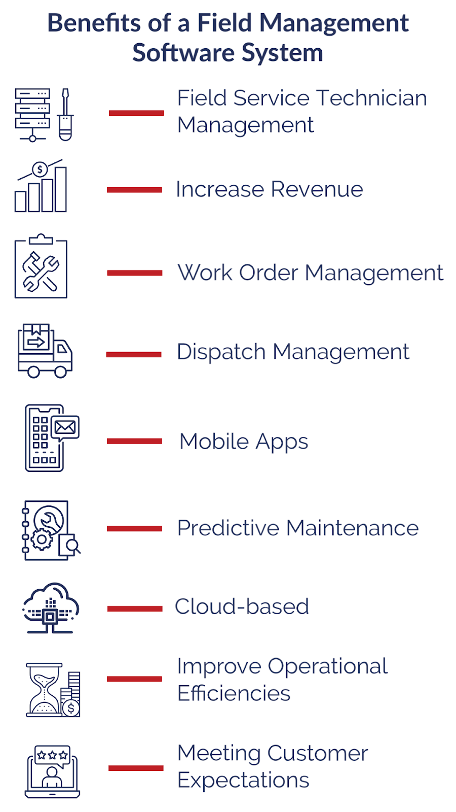Field service management (FSM) has become increasingly complex over the years. Field service businesses need to manage their field service operations efficiently to meet customer expectations and ensure customer satisfaction. This is where a field management system can help.
What Is a Field Management System?
A field management system is a software tool that helps field service teams manage their daily operations, work orders, and dispatch management.
Below, we’ll discuss the benefits of using a field management system and how it can help field service businesses improve their operational efficiencies, customer service, and ultimately increase their revenue.
9 Benefits of a Field Management System
1. Work Order Management
A field management system can help businesses manage their work orders in a more efficient manner. Field service technicians can receive work orders in real-time through their mobile apps. This means that they can start working on the work order as soon as it is assigned to them. This improves the time-to-fix rates and ensures that the job is completed within the allocated time frame.
2. Dispatch Management
Dispatch management is one of the critical aspects of field service management. A field management system can help businesses manage their dispatch operations efficiently. The system can optimize dispatch schedules to ensure that the right technician is sent to the right job at the right time. This helps to reduce travel time and increase the number of jobs that can be completed in a day. Using a system that helps with this can save time and improve communication between the field and the back office as well. Technicians are automatically notified that a new job has been added to their schedule.

3. Mobile Apps
Mobile apps are an essential component of a field management system. Field service technicians can use mobile apps to receive work orders, update job status, and communicate with the back-office team. This improves communication and collaboration between the field service team and the back-office team, leading to faster problem resolution and increased customer satisfaction.
4. Predictive Maintenance
A field management system can help businesses implement predictive maintenance strategies. Predictive maintenance uses data analytics and machine learning algorithms to identify potential problems before they occur. This helps businesses to reduce downtime and increase the lifespan of the equipment.
5. Cloud-based
Cloud-based field management solutions offer many benefits. First, they allow businesses to access their data from anywhere, at any time. This means that field service teams can access work orders and job details from the field, increasing their productivity. Second, cloud-based solutions are more secure than on-premises solutions. This reduces the risk of data breaches and ensures that sensitive data is protected.
6. Improve Operational Efficiencies
A field management system can help businesses improve their operational efficiencies. The system can automate routine tasks such as scheduling, dispatch, and invoicing. This reduces the workload of the back-office team and allows them to focus on more critical tasks. Additionally, the system can provide real-time insights into field service operations, allowing businesses to identify areas for improvement and implement corrective actions.
7. Meeting Customer Expectations
Field service businesses need to meet customer expectations to ensure customer satisfaction. A field management system can help businesses achieve this by providing real-time updates to customers about the status of their job. This improves communication and transparency, leading to increased customer satisfaction.
8. Field Service Technician Management
Managing field service technicians can be challenging, especially for businesses with a large workforce. A field management system can help businesses manage their field service technicians more efficiently. The system can track the location of technicians, assign work orders based on their skills and availability, and monitor their performance.
9. Increase Revenue
Implementing a field management system can help businesses increase their revenue. The system can help businesses complete more jobs in a day, leading to increased revenue. Additionally, the system can help businesses reduce downtime, increase the lifespan of equipment, and improve customer satisfaction. All of these factors contribute to increased revenue for the business.
A field management system can help field service businesses improve their operational efficiencies, customer service, and increase their revenue by automating routine tasks and optimizing dispatch schedules.
Partner With Payzerware
Payzerware is a field management system that does it all! With over 20+ applications in one easy-to-use workflow, contractors are simplifying operations, improving collections and selling more with Payzerware. Click here to schedule a free demo and to see how Payzerware can help your business this year.
Field Management System Frequently Asked Questions
What is an example of a field service management system?
There are a lot of field service management systems out there. The most popular in the home services industries are ServiceTitan, Payzerware, FieldEdge, HousecallPro, ServiceMax, or Jobber.
What does field service management software do?
Field service management software helps organizations manage and optimize their field service operations. This includes scheduling and dispatching technicians, managing work orders and inventory, tracking time and expenses, and analyzing data to improve efficiency and customer satisfaction.
What are field-based services examples?
Field-based services refer to any service that is performed outside of a company’s office or facility. Examples of field-based services include HVAC repair, plumbing, pest control, landscaping, and telecommunications installation and maintenance.
How much is field management software?
The cost of field management software can vary depending on the specific features and functionality required, as well as the size and complexity of the organization. Prices can range from a few hundred dollars to thousands of dollars per user per year.







